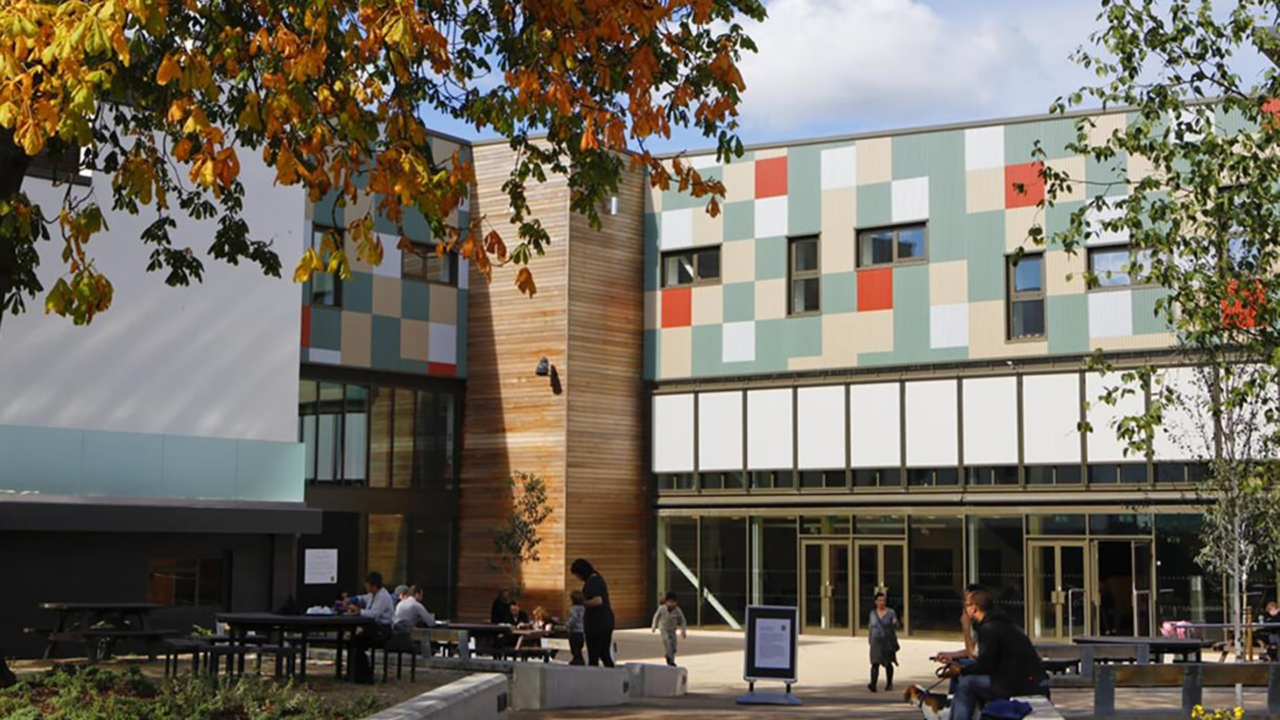- Posted on August 20th, 2025
Story of Change: Midlands Arts Centre (MAC)

Midlands Arts Centre (MAC), located just south of Birmingham city centre, is a vibrant multi-use arts facility known for its extensive programming and community engagement. It has embarked on a determined journey to reduce its energy consumption and carbon emissions, particularly since 2018-2019. This case study explores MAC’s efforts, led by Lizzie Moran, Head of Technical Resources, to integrate sustainability into its operations, leveraging participation in Art Council England’s Transforming Energy: Capital Investment Ready programme to drive decarbonisation.
Where MAC is starting from…
MAC’s building reflects a patchwork of architectural styles, constructed incrementally from the 1960s to as recently as 2020. This mix of structures, from 1960s originals to a major 2009 refurbishment and a 2020 studio addition, presents unique challenges for energy management.
MAC has achieved a year-on-year reduction in carbon usage since the 2018-2019 period and was part of the Art Council England’s Spotlight Programme for setting and developing a carbon reduction for reducing its energy-related carbon footprint. The progress MAC has made to date stems from its carbon management plan, which Lizzie authored.
Early Wins in Energy Reduction
MAC’s journey began with practical, low-cost measures to curb energy use. The centre implemented “quick wins” such as transitioning to LED lighting across much of the facility, insulating the boiler room, and installing sensor taps to reduce water and associated energy waste. These initial steps demonstrated MAC’s commitment to sustainability and laid the groundwork for more ambitious goals. Data collection on energy-related greenhouse gas emissions (Scope 1: gas and Scope 2: electricity) provided a solid foundation for tracking progress towards decarbonisation of the Centre’s building related carbon footprint. Scope 3 emissions (indirect emissions from the value chain) remain an area for future exploration.
The Capital Investment Ready Programme: A Catalyst for Change
The Capital Investment Ready programme marked a pivotal shift in MAC’s approach, encouraging the team to “think big” about decarbonisation. Lizzie highlighted how the programme spurred a focus on large-scale investments rather than incremental fixes. A key priority emerged: replacing gas boilers with heat pumps as they reach the end of their operational life. However, the building’s current state, described as “quite leaky”, requires substantial upgrades to its fabric and insulation to make heat pumps viable. This realisation underscored the need for significant capital investment, a challenge MAC is now preparing to address.
The programme also provided valuable resources, including access to building energy experts like Catherine Bottrill and Russell Layberry (Pilio), who offered guidance on technical questions such as energy sub-metering for monitoring energy use around the different areas of the Centre. For instance, when Lizzie considered installing clamp-on meters to monitor energy use in specific areas, Russell’s input helped weigh the cost-benefit, ensuring resources were allocated effectively. While the programme does not recommend specific suppliers, it encouraged MAC to seek external advisors, such as Green Net Zero, accessed through Sustainability West Midlands, to support them in developing their decarbonisation strategy. During the course of the Capital Investment Readiness programme, Lizzie refined their carbon reduction management plan.
Engaging Senior Management
A critical component of MAC’s journey has been securing buy-in from senior management. Although the leadership team at MAC has a reasonable awareness of sustainability, it often competes with other pressing priorities. The Capital Investment Ready programme provided a structured framework for engagement, enabling Lizzie to present findings backed by external validation to the board. Regular check-ins and presentations ensured decarbonisation remained a priority, reinforcing its importance with data-driven insights and expert support. This approach has been instrumental in maintaining momentum and aligning sustainability with MAC’s broader operational goals.
Challenges and Future Steps
MAC faces significant hurdles, notably the high cost of retrofitting its diverse building stock for heat pumps. The leaky building fabric demands a comprehensive insulation overhaul, a project that requires substantial funding and planning.
Additionally, while quick wins have yielded results, scaling up to deeper decarbonisation efforts will necessitate preparation of the business case for return of investment and prepared of feasibility studies to understand the technology options and associated costed.
Looking ahead, MAC has outlined actionable next steps:
- Leveraging Programme Resources: Using the online materials on the Transforming Energy and benefiting from the learning of peer organisation participating in the programme.
- Engaging Advisors: Connect with recommended advisors like Green Net Zero to refine decarbonisation strategies.
- Exploring Heat Pump Transition: Assess options for replacing gas boilers with heat pumps, integrating building fabric improvements into the plan. Green Net Zero are able to create a 3-D model to provide a visual
and dynamic way to illustrate the energy performance gains of different decarbonisation investments. - Board Advocacy: Present programme findings to senior management, securing their commitment to fund and prioritize sustainability initiatives.
Conclusion
Midlands Arts Centre’s journey since 2018-2019 reflects a proactive and evolving approach to reducing energy and carbon emissions. From initial quick wins like LED lighting and boiler insulation to ambitious plans for heat pump adoption, MAC has demonstrated resilience and adaptability. The Capital Investment Ready programme has been a game-changer, empowering Lizzie and her colleagues to think boldly, access expert guidance, and engage senior leadership effectively.
While challenges remain, particularly around funding and building upgrades, MAC’s commitment to sustainability positions it as a leader among arts institutions striving for a greener future. As of April 2025, MAC continues to build on its progress, balancing its role as a cultural hub with a responsibility to decarbonise for the benefit of its community and the planet.
The Transforming Energy, Capital Investment Ready Programme is no longer running live events, however, you can still sign up to receive a full suite of free training materials, articles and an energy-focused newsletter twice a year.
Resource Materials
Read More About Energy and Emissions Reduction